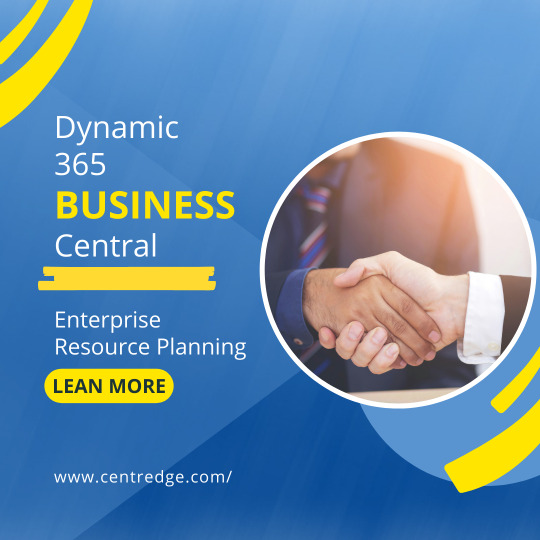#Microsoft Cloud ERP
Explore tagged Tumblr posts
Text

Why is Dynamics 365 Business Central a Game-Changer for Manufacturers?
Transform your business with custom insights that drive smarter decisions!
With BC and GSUS, you can:
1. End-to-End Process Integration —It integrates finance, production, supply chain, inventory, and customer service into one platform, eliminating silos, improving efficiency, and enabling real-time collaboration across departments.
2. Real-Time Insights for Better Decision-Making —With real-time reporting and built-in analytics, Business Central provides manufacturers with actionable insights into production, inventory, sales, and finances, enabling quick, informed decisions and enhanced agility in response to market changes.
3. Smarter Inventory and Production Management —It optimizes inventory and production scheduling, reducing waste, improving stock accuracy, and streamlining workflows. Automation and supply chain visibility cut lead times and stockouts and boost profits.
Take Efficiency to the Next Level 📈
Reach us on: www.gsussoftware.in / [email protected]
Call us on: +91 7339566389
#erp development company#erp#business central#erp for manufacturing#erp software#erp integration#app development#microsoft#it company#cloud erp#businesstransformation#sap#businessgrowth
0 notes
Text
https://www.saglobal.com/int/our-products/erp-modernization-and-enterprise-productivity-apps-with-microsoft-service-centric-industry-cloud.html
Unified Cloud Platform: Your Path to ERP Digital Transformation with Microsoft Industry Cloud
Accelerate your business growth with our unified cloud platform. Leverage Microsoft Industry Cloud for seamless ERP digital transformation and access a suite of cloud-based productivity apps.
0 notes
Text
Discover the top SaaS ERP solutions for 2024, designed to streamline business operations. Explore platforms like NetSuite, SAP, and Microsoft Dynamics that offer cloud-based ERP features for finance, inventory, and HR, ensuring scalability and growth.
#SaaS ERP solutions#cloud ERP#best ERP software 2024#ERP for businesses#enterprise resource planning#NetSuite#SAP ERP#Microsoft Dynamics.
0 notes
Text
The Future of Project Management Consultancy: Trends to Watch in 2024
Companies are changing to match a world that’s getting more and more intricate. So, Project Management Consultancy has become crucial. Advisors are not just there to help with procedures anymore. They're valuable partners assisting organizations to reach their targets effectively. In 2024, a few important trends are impacting this advice area. The cause of these changes? Technology, our rollercoaster global economy, and shifting business scenes. This is all leading to a new way of overseeing projects across different sectors.

AI and Automation in Project Management: Artificial Intelligence (AI) and automation are changing how project management consultants work. They can't do without AI-powered tools anymore. These tools help analyze project data, find risks, and improve workflows. Also, predictive analytics can foresee project results using past data. This lets consultants make decisions ahead of time.
By 2024, it's expected that consultants will use AI more for a few key tasks. Automated reporting is one such task. AI tools could make real-time progress reports. This way, consultants might concentrate more on big-picture decisions. Next, we have risk management. Consulting teams may use predictive algorithms to spot risks early on during a project. Lastly, for resource optimization, AI might give suggestions on how to best use resources. This can help ensure projects get finished on schedule and under budget.
Rise of Hybrid Project Management Methodologies: Today, businesses are dealing with old-school and modern project needs. They're finding value in using hybrid project management styles. These styles mix agile and waterfall methods, giving them the freedom to act while still having a clear plan in place.
Project management advisors assist firms in three main ways. First, they modify strategies to meet a project's unique demands. Second, they enable the shift to agile, a trending methodology. Simultaneously they merge it with classic methods for projects with strict deadlines or outputs. Lastly, the advisors create elastic strategies. These plans let teams tweak their direction swiftly when necessary.
Increased Focus on Sustainability and ESG Compliance: By 2024, Project Management will see a rise in its relationship with Environmental, Social, and Governance (ESG) principles. These considerations will become key in project coordination. This means consultants will guide projects to be greener and meet ESG objectives.
Consultants have jobs like:
Taking green measurements: They aid groups in monitoring and quantifying the ecological effects of their plans.
Recommending environment-friendly methods: they steer corporations towards embedding eco-friendly advancements and methodologies in their project completion.
Guaranteeing adherence to rules: They confirm projects adhere to worldwide and regional ESG criteria and recognitions.
Remote and Hybrid Workforces: In a world changed by the pandemic, remote and mixed work methods are reshaping project management advising. By 2024, advisors will face the task of leading spread-out groups, perfecting smooth chat, and keeping up efficiency over different time zones.
Consultants make a big impact in several fields. They use virtual project management tools like Microsoft Teams, Slack, and Asana to keep remote teams on the same page. They guide companies in managing remote staff efficiently and integrating them into the workflow. They also ensure everyone stays focused. They create strategies to keep scattered teams synchronized with project goals and timelines. And they overcome differences in location and time.
Digital Transformation Projects on the Rise: Transforming to digital is still a main concern for companies everywhere, and project management consultants are at the forefront of this change. They're navigating tasks like automating daily jobs and shifting systems to the cloud. These tech-savvy guides assist businesses in embracing technology, leading to better operations and fresh ideas.
By 2024, consultants have shifted their focus towards several key areas. First, they're in-charge of controlling IT infrastructure projects. This includes complex initiatives such as ERP (Enterprise Resource Planning) setup, moving to the cloud, and creating software. They're also helping businesses handle the cultural and operational changes necessary for a successful digital transition. Lastly, they are facilitating the seamless combination of new tech with current systems and processes.
Conclusion:
In 2024, the project management consultancy world will be reshaped. Technology, sustainability, and a changing workforce will drive this change. Consultants are preparing. They use AI, flexible work setups, data analysis, and emotional smarts. Now, they are not just project leaders, but also commercial growth drivers. Watching these trends is important. Why? Because consultants need to offer value. They face strong competition and must stay ahead.
#Project Management Consultancy#Customer Relationship Management#Netsuite Ecommerce#IBM Cloud#ERP software#Microsoft Dynamics 365#cpm tools#erp system in new zealand#fusion5
0 notes
Text
#ERP Services#ERP Development#ERP Software Development#ERP Software Development near me#ERP Software Development for Businesses#ERP Software Development in India#ERP development Process#ERP Development Company#ERP Development Services#ios app development company in noida#custom software development company in noida#software development company in noida#app development in noida#Cloud Consulting Services#Cloud Consulting Services in Noida#software development company in india#Mobile App Development Company#Mobile App Development Company near me#Cloud Consulting Services & Solutions#Cloud Consulting Services in India#Cloud Services#Cloud Strategy & Consulting Service#Cloud Managed Services#AWS cloud consulting services#Cloud Software Consulting Services#Amazon Cloud Consulting Services#Cloud Consulting Services India#Microsoft Azure cloud consulting services#Best Service cloud consulting providers#AWS Cloud Services
0 notes
Text
#Microsoft Dynamics 365#cloud-based ERP and CRM solution#Microsoft Dynamics 365 ERP implementation#Dynamics 365 integrate#Dynamics 365 Sales.#Dynamics 365 Customer Service.#Dynamics 365 Finance.#Dynamics 365 Supply Chain Management.#Dynamics 365 Human Resources.#Dynamics 365 Marketing.#Dynamics 365 Commerce.
0 notes
Text
Top 15 ERP Systems for Small Businesses in 2024

In today’s business environment, small businesses require robust ERP systems to manage operations efficiently. An ERP (Enterprise Resource Planning) system streamlines key business functions like finance, inventory, HR, and supply chain management, helping businesses make data-driven decisions. While traditionally seen as solutions for large enterprises, many ERP systems now cater specifically to small businesses, offering scalability, flexibility, and cost-effectiveness.
Here’s a list of the top 15 ERP systems for small businesses in 2024:
1. SAP Business One
A leading choice for small and midsize businesses, SAP Business One is known for its comprehensive features covering financial management, inventory, sales, and customer relationships. Its scalable nature allows businesses to grow without outgrowing their ERP solution.
2. Oracle NetSuite
Oracle NetSuite remains a popular cloud-based ERP solution, offering a unified business management suite that includes ERP, CRM, and e-commerce features. Its customizable and scalable platform is ideal for growing businesses.
3. Microsoft Dynamics 365 Business Central
Designed for small to medium businesses, Dynamics 365 Business Central provides end-to-end management of finances, sales, service, and operations. Its integration with other Microsoft tools like Office 365 and Power BI adds significant value.
4. Odoo
Odoo offers a unique blend of affordability and flexibility with its open-source ERP platform. It provides a wide range of modules, including CRM, inventory management, accounting, and more, making it a top choice for businesses on a budget.
5. Zoho ERP
Zoho is known for its extensive suite of business tools, and its ERP platform is no different. Zoho ERP covers everything from project management to financial reporting, making it a versatile option for small businesses.
6. Acumatica
Acumatica is a cloud-based ERP solution with a focus on ease of use and flexibility. It offers industry-specific editions, making it suitable for small businesses across different sectors.
7. Sage Intacct
Sage Intacct stands out for its robust financial management capabilities. It’s a preferred solution for businesses seeking a cloud-based ERP with strong accounting and budgeting features.
8. Infor CloudSuite
Infor CloudSuite provides small businesses with industry-specific ERP solutions. Known for its intuitive design and real-time data insights, Infor is perfect for businesses in manufacturing, distribution, and services.
9. Epicor
Epicor ERP is tailored to small and mid-sized businesses, particularly those in manufacturing, distribution, and retail. Its modular approach allows businesses to pick and choose the features that suit their needs.
10. Tally ERP 9
Tally is a household name among small businesses, especially in India. It’s known for its simplicity and powerful accounting features, making it a go-to solution for financial management.
11. QuickBooks Enterprise
QuickBooks is already popular for accounting, and its Enterprise version extends these capabilities to provide an all-in-one ERP solution. It’s particularly suitable for small businesses that prioritize financial management.
12. Brightpearl
Brightpearl is an excellent choice for retail and e-commerce businesses. It integrates ERP, order management, inventory, and accounting into one platform, helping businesses streamline their operations.
13. SYSPRO
SYSPRO offers an ERP solution with a focus on manufacturing and distribution. Its small-business edition is packed with industry-specific features and offers deep customization.
14. ERPNext
ERPNext is an open-source ERP solution offering a wide range of features for manufacturing, retail, services, and more. It’s highly customizable and provides a cost-effective solution for businesses looking for flexibility.
15. Priority ERP
Priority ERP offers cloud-based and on-premise solutions tailored for small businesses. With its user-friendly interface and modular design, it provides scalability and control at an affordable cost.
Choosing the right ERP system for your small business depends on your industry, specific needs, and budget. The options listed above provide a broad range of features and pricing models that can accommodate businesses of varying sizes and requirements. By investing in the right ERP, small businesses can unlock greater efficiency, improve decision-making, and scale operations seamlessly.
Partnering with Business Central ERP experts like Intelegain Technologies can help you discover the perfect ERP solution tailored to your small business needs. Get in touch with us to begin your journey toward streamlined operations and enhanced growth.
#erp software#dynamics 365#software development#technology#cloud services#microsoft#erp services#erp solution#erp systems#erp implementation#business central erp support services#d365 business central
0 notes
Text
Integrate business functions for peak efficiency with Dynamics 365 ERP
Comprehensive ERP Solutions Tailored To Your Business Needs
An efficient ERP system is the backbone of a thriving business. Focus Dynamics delivers customised Dynamics 365 ERP solutions that integrate all aspects of your business, from finance to operations to customer relations. Our expertise with Dynamics 365 ERP ensures seamless integration, providing a unified view of your business and actionable insights.
By addressing common ERP challenges such as data silos and process inefficiencies, we empower your business to operate more cohesively and responsively. Our ERP solutions pave the way for enhanced decision-making, operational agility, and a significant return on investment.
#business central#dynamics 365 business central#dynamics business central#microsoft dynamics business central#dynamics erp#microsoft dynamics 365 erp#dynamics 365 erp#microsoft dynamics erp#erp software#erp solution#erp#cloud erp
0 notes
Text
#sap software service#it service#oracle#microsoft development#it services#erp software#erp solution#erp systems#cloud erp#crm software
0 notes
Text
Boost Your Business with Microsoft Accounting Software in Singapore
Running a successful business in Singapore requires efficient and reliable tools. One essential tool is Microsoft accounting software. This software helps manage finances, streamline operations, and enhance decision-making. Microsoft offers a comprehensive solution to meet your business needs.
Why Choose Microsoft Accounting Software in Singapore?
Businesses in Singapore face unique challenges. Regulatory compliance, financial reporting, and tax requirements are complex. Microsoft accounting software simplifies these tasks. It ensures accuracy and saves time.
Compliance: Microsoft accounting software helps businesses comply with local laws and regulations. This reduces the risk of penalties.
Accuracy: Automated processes minimize errors. This leads to accurate financial records.
Efficiency: Streamlined workflows save time. Businesses can focus on growth and innovation.
Features of Microsoft Cloud-Based ERP Solutions
Microsoft's cloud-based ERP solutions offer flexibility and scalability. These solutions integrate various business functions. This improves collaboration and data sharing.
Flexibility: Cloud-based ERP solutions adapt to changing business needs. They support growth and expansion.
Scalability: Businesses can scale up or down as needed. This ensures optimal resource utilization.
Integration: ERP solutions integrate with other Microsoft tools. This enhances productivity and efficiency.
Benefits of Microsoft Cloud-Based ERP Solutions
Cloud-based ERP solutions offer numerous benefits. They improve accessibility, reduce costs, and enhance security.
Accessibility: Employees can access data from anywhere. This supports remote work and collaboration.
Cost Reduction: Cloud-based solutions reduce the need for physical infrastructure. This lowers costs.
Security: Microsoft provides robust security measures. This protects sensitive business data.
Microsoft D365 ERP: A Comprehensive Business Solution
Microsoft D365 ERP is a powerful tool. It integrates various business functions into a single platform. This improves efficiency and decision-making.
Integration: D365 ERP integrates finance, sales, and operations. This ensures seamless data flow.
Customization: Businesses can customize D365 ERP to meet specific needs. This enhances usability.
Analytics: Advanced analytics provide insights into business performance. This supports strategic planning.
Key Features of Microsoft D365 ERP
D365 ERP offers features that enhance business operations. These include real-time data, automated workflows, and predictive analytics.
Real-Time Data: Businesses get real-time insights into operations. This improves responsiveness.
Automated Workflows: Automation reduces manual tasks. This increases efficiency.
Predictive Analytics: Predictive analytics support proactive decision-making. This improves outcomes.
How Microsoft D365 ERP Can Transform Your Business
Implementing D365 ERP can transform your business. It improves productivity, reduces costs, and enhances customer satisfaction.
Productivity: D365 ERP streamlines processes. This boosts productivity.
Cost Reduction: Automation and integration reduce operational costs. This improves profitability.
Customer Satisfaction: Improved operations lead to better customer service. This enhances satisfaction.
Conclusion
Choosing the right tools is crucial for business success. Microsoft accounting software and cloud-based ERP solutions offer comprehensive features. These tools improve efficiency, accuracy, and compliance. Implementing Microsoft D365 ERP can transform your business operations. Invest in Microsoft solutions to stay ahead in the competitive Singapore market.
For more information on how these solutions can benefit your business, visit the following links:
Microsoft accounting software Singapore
Microsoft cloud-based ERP solutions
Microsoft D365 ERP
Enhance your business with Microsoft's innovative solutions today!
0 notes
Text
Boost Your Business with Microsoft Accounting Software in Singapore

Running a successful business in Singapore requires efficient and reliable tools. One essential tool is Microsoft accounting software. This software helps manage finances, streamline operations, and enhance decision-making. Microsoft offers a comprehensive solution to meet your business needs.
Why Choose Microsoft Accounting Software in Singapore?
Businesses in Singapore face unique challenges. Regulatory compliance, financial reporting, and tax requirements are complex. Microsoft accounting software simplifies these tasks. It ensures accuracy and saves time.
Compliance: Microsoft accounting software helps businesses comply with local laws and regulations. This reduces the risk of penalties.
Accuracy: Automated processes minimize errors. This leads to accurate financial records.
Efficiency: Streamlined workflows save time. Businesses can focus on growth and innovation.
Features of Microsoft Cloud-Based ERP Solutions
Microsoft's cloud-based ERP solutions offer flexibility and scalability. These solutions integrate various business functions. This improves collaboration and data sharing.
Flexibility: Cloud-based ERP solutions adapt to changing business needs. They support growth and expansion.
Scalability: Businesses can scale up or down as needed. This ensures optimal resource utilization.
Integration: ERP solutions integrate with other Microsoft tools. This enhances productivity and efficiency.
Benefits of Microsoft Cloud-Based ERP Solutions
Cloud-based ERP solutions offer numerous benefits. They improve accessibility, reduce costs, and enhance security.
Accessibility: Employees can access data from anywhere. This supports remote work and collaboration.
Cost Reduction: Cloud-based solutions reduce the need for physical infrastructure. This lowers costs.
Security: Microsoft provides robust security measures. This protects sensitive business data.
Microsoft D365 ERP: A Comprehensive Business Solution
Microsoft D365 ERP is a powerful tool. It integrates various business functions into a single platform. This improves efficiency and decision-making.
Integration: D365 ERP integrates finance, sales, and operations. This ensures seamless data flow.
Customization: Businesses can customize D365 ERP to meet specific needs. This enhances usability.
Analytics: Advanced analytics provide insights into business performance. This supports strategic planning.
Key Features of Microsoft D365 ERP
D365 ERP offers features that enhance business operations. These include real-time data, automated workflows, and predictive analytics.
Real-Time Data: Businesses get real-time insights into operations. This improves responsiveness.
Automated Workflows: Automation reduces manual tasks. This increases efficiency.
Predictive Analytics: Predictive analytics support proactive decision-making. This improves outcomes.
How Microsoft D365 ERP Can Transform Your Business
Implementing D365 ERP can transform your business. It improves productivity, reduces costs, and enhances customer satisfaction.
Productivity: D365 ERP streamlines processes. This boosts productivity.
Cost Reduction: Automation and integration reduce operational costs. This improves profitability.
Customer Satisfaction: Improved operations lead to better customer service. This enhances satisfaction.
Conclusion
Choosing the right tools is crucial for business success. Microsoft accounting software and cloud-based ERP solutions offer comprehensive features. These tools improve efficiency, accuracy, and compliance. Implementing Microsoft D365 ERP can transform your business operations. Invest in Microsoft solutions to stay ahead in the competitive Singapore market.
For more information on how these solutions can benefit your business, visit the following links:
Microsoft accounting software Singapore
Microsoft cloud-based ERP solutions
Microsoft D365 ERP
Enhance your business with Microsoft's innovative solutions today!
0 notes
Text

🌾 Unlock the future of farming with GSUS! Our ERP solution is designed to streamline operations, boost productivity, and drive sustainable growth for Agriculture. Let’s cultivate success together! 🚜✨
Book Demo Today!!!! 🌎 www.gsussoftware.in
Reach us on: [email protected] Call us on: +91 7339566389
#GSUS#gsussoftware#gsusstarsoftware#erpsolutions#erpsystem#ERPImplementation#DigitalTransformation#businesssolutions#businessgrowth#BusinessCentral#sap
#business central#erp#erp development company#erp for manufacturing#erp software#erp integration#it company#app development#cloud erp#microsoft
0 notes
Text

Microsoft Dynamics 365 Business Central is a powerful enterprise resource planning (ERP) solution offered by Microsoft. It streamlines business operations, enhances productivity, and provides valuable insights for informed decision-making. With Dynamics Business Central, organizations can efficiently manage their finances, supply chain, and customer relationships, making it a valuable tool for modern businesses.
#microsoft dynamics 365 business central#business central#dynamics 365 business central#microsoft business central#dynamics business central#enterprise resource planning#erp enterprise resource planning#enterprise erp systems#cloud enterprise resource planning#erp resource planning#erp in management information system
0 notes
Text
Explore the key differences between Microsoft Dynamics 365 Finance & Operations and Oracle Cloud ERP in this detailed comparison for 2024. Discover their unique features, scalability, ease of use, and integration capabilities. This guide helps businesses determine the best ERP solution based on their size, industry needs, and existing systems. Whether you prioritize user-friendly interfaces or advanced functionalities, understanding these platforms will empower your decision-making process for a more efficient future.
#Microsoft Dynamics 365#Oracle Cloud ERP#ERP comparison 2024#cloud-based solutions#business software#enterprise resource planning#scalability#integration#software evaluation.
0 notes
Text
Dynamics 365 Cloud has all the components for Digital Transformation. It has the critical business applications, CRM and ERP to lead the digital transformation.
#Digital Transformation For Businesses#Microsoft Dynamics 365 Cloud AI & ML#Digital Transformations with Office 365#Microsoft Dynamic 365 ERP
0 notes